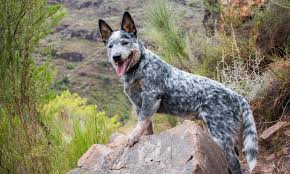
Australian Cattle Dog
Conditions of detention
Australian Cattle Dogs thrive in environments where they have plenty of space to roam and exercise. They are best suited to rural or suburban settings with large, securely fenced yards.
Useful Fact: They can adapt to apartment living if given sufficient exercise and mental stimulation, but they generally prefer larger spaces where they can be active.
Nutrition and diet
A balanced diet of high-quality dog food appropriate for their age, size, and activity level is essential.
Useful Fact: Due to their high energy levels, they may benefit from a diet rich in protein to support their muscle development and overall health.
Health
The Australian Cattle Dog is generally a healthy breed but can be prone to certain genetic conditions such as hip dysplasia, progressive retinal atrophy (PRA), and deafness.
Useful Fact: Regular veterinary check-ups and early screening for genetic conditions can help maintain their health.
Grooming and care
The breed has a short, dense coat that requires minimal grooming. Weekly brushing will help remove loose hairs and keep their coat healthy.
Useful Fact: During shedding seasons, more frequent brushing may be needed to manage their coat.
Education and training
Australian Cattle Dogs are intelligent and eager to please, making them relatively easy to train. Positive reinforcement methods are most effective.
Useful Fact: Early socialization and consistent training are crucial to harness their natural herding instincts and ensure good behavior.
Toys and entertainment
They enjoy interactive toys, puzzle games, and activities that challenge their minds and keep them physically active.
Useful Fact: Engaging them in activities that mimic herding can be particularly satisfying for this breed.
Safety
Provide a secure, fenced yard to prevent them from wandering off. Their strong herding instincts require vigilant supervision, especially around small animals and children.
Useful Fact: Use a sturdy leash during walks to control their energy and prevent them from chasing moving objects.
Accessories
Essential accessories include a comfortable bed, a sturdy leash and harness, food and water bowls, and grooming tools.
Useful Fact: Invest in durable, high-quality toys that can withstand their active play and strong jaws.
Socialization
Early and continuous socialization with different people, pets, and environments is crucial for developing a well-rounded dog.
Useful Fact: Puppy socialization classes can provide structured learning and help them develop positive behaviors.
Travel and Transportation
They generally travel well but should be secured in a crate or with a dog seat belt for safety during car rides.
Useful Fact: Frequent breaks during long trips help them stretch and relieve themselves, making travel more comfortable.
Behavior and psychology
Australian Cattle Dogs are known for their energetic, intelligent, and loyal nature. They thrive on human interaction and can become anxious if neglected.
Useful Fact: Consistent routines and positive reinforcement help them feel secure and well-behaved.
Legal aspects
Ensure your pet is registered and compliant with local laws regarding vaccinations and licensing.
Useful Fact: Microchipping your dog provides a permanent ID, increasing the chances of being reunited if lost.


